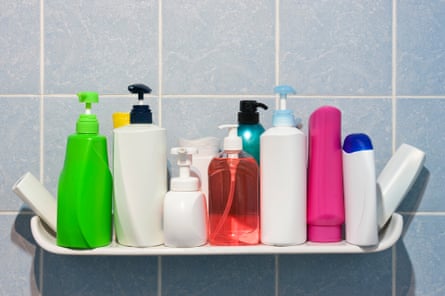To combat dry skin, lower the temperature of your shower to keep microbes at bay.skin care

aWe are plagued by changing weather and many of us suffer from dry skin and chapped lips. Dry skin is not only annoying and cosmetically challenging, but it can lead to more serious problems, especially when accompanied by itching and rashes.
Clinical Professor and Dermatologist saxon smith Dry skin, or xerosis, is said to become more common as we age. “So our skin starts to dry out a bit.”
Environmental causes of dry skin include low humidity due to wind and cold, indoor heating, and hot, long baths or showers. Hot summer breezes “are like forced ovens for us,” says Smith. It can be dry as well as being exposed to strong sunlight. Even on a hot day indoors, the air conditioner sucks the moisture out of the air.
frequent hand washing When hand sanitizerespecially those containing alcohol, also have a drying effect. These hygiene measuresWith long-term wearing of face masks, skin problems such as: dry skin When itch.
In addition to this, says Smith, the typical soap these days is more like a detergent. It was an ad for a particular brand of soap product,” says Smith. The pitch worked so well that it became the norm.
general skin care
The medical term for dry skin, xerosis, literally means lack of fat. The skin secretes an oily substance to retain moisture and prevent infection. sebum.
Exposure to the elements, over-cleansing, and aggressive exfoliation can all wash away sebum, but they can also cause your body to produce more sebum. It slows down with age and can be compromised by many other factors, including hormones, medications, smoking, allergies, and diet.
Start with 3 simple daily habits to protect your skin. “Soap-free cleansing, moisturizers, and lukewarm showers are the dermatology mantra on how to care for your skin,” says Smith. “They are what we call general skin care.”
Summers may require a light moisturizer, but during the colder months, skin craves more hydration to help it normalize, so thicker creams and short, not-too-hot showers are strongly recommended. To offset the benefits of regular hand washing, Smith recommends applying a hand moisturizer at the beginning of the day and before bed. , can prevent and treat chapped lips.

Other recommendations to prevent dry skin include using a humidifier in dry indoor environments, avoiding alcohol-based skin products, staying hydrated by drinking plenty of water, avoiding excessive sun exposure, quit smoking
Suspicious stimulants should be avoided. This could include perfumes and dyes in skin products. some laundry supplies used for clothing.
microbial brigade
“Our skin and bodies are covered with bacteria and other microbes,” says Smith. Our skin is home to a whopping trillion of them, and “to quote Shakespeare, they are a natural part of our environment’s defense mechanism against the outrageous slings and arrows of fortune, and their balance.” It is really important to keep
These microbes help maintain a healthy skin barrier, explains Dr. Chris Coalwert, a researcher at the Center for Microbial Ecology and Technology, Belgium. “They transform sebum, create an ‘acid mantle’ in the skin, and protect it from other harmful pathogens and viruses,” he says.
“The skin microbiome trains our immune system and creates a healthy balance of immune responses. It will be.”
Beyond the drying effects of soaps and washes, the antibacterial ingredients and preservatives in deodorants, antiperspirants, shower gels, body washes, shampoos and cosmetics are also being sacrificed. contains some kind of ingredient that kills or inhibits bacteria,” says Callewart.

These products also indirectly affect microbes as their cleansing and fat removing ingredients alter the natural environment and the ecosystems that support them. Not necessarily.
To protect healthy skin bacteria, consider avoiding antiperspirants and cosmetics altogether, or at least so you can familiarize yourself with product ingredients and avoid those known to be harmful. Callewaert suggests that Inci Decodera plain English guide to cosmetic ingredients can help with this.
what’s underneath
“Skin is the largest organ in terms of body surface area,” says Smith. “It’s very complicated because it’s a barrier that shuts off both the outside and the inside.”
When dry, “cracks can form in the pavement, like cracks in the surface of a dried-up floodplain,” says Smith. “If the skin is cracked, more things can penetrate and the immune system can be activated.” there is.
“Maintaining the skin barrier in the broadest sense is very important for all of us. It’s not just the fact that itching irritates us when the skin is dry. It’s also about keeping it in check and ensuring that our skin is exposed to what’s supposed to protect us.
A healthy diet can help support healthy skin. also support Resilient Gut Microbiome, New Study Linked to the skin. “Having a healthy gut leads to healthy skin,” says Callewaert. “If something isn’t right in your gut, it can definitely affect your skin and skin microbiome. Many bowel disorders are associated with skin disorders, he added. increase.
when to see a medical professional
Dry skin can cause irritation and itching. If the rash starts to turn red and the skin becomes irritated and thickened or infected, Smith says, whether itchy or not, this could indicate a skin condition such as eczema or psoriasis. .
He suggests it’s time to see a medical professional and recommends your GP as a good start.
To combat dry skin, lower the temperature of your shower to keep microbes at bay.skin care
Source link To combat dry skin, lower the temperature of your shower to keep microbes at bay.skin care






